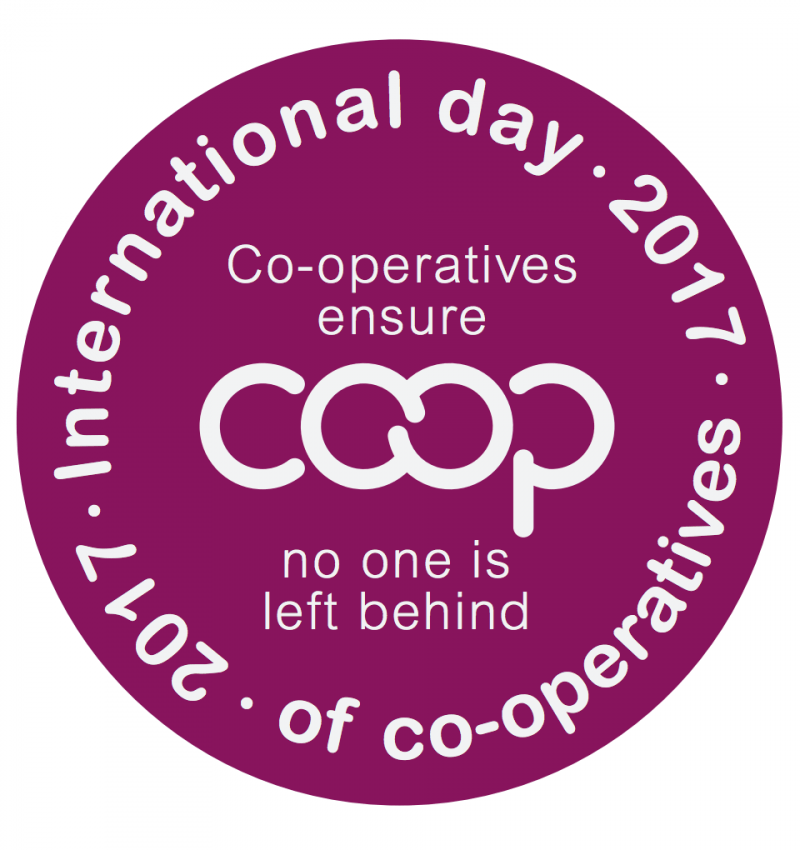
95TH INTERNATIONAL CO-OPERATIVE DAY
23RD UNITED NATIONS INTERNATIONAL DAY OF CO-OPERATIVES
1 JULY 2017
At a time when income inequality is rising around the world, it is good to remember that solutions for inequality exist. The co-operative model is foremost among these. Its internationally agreed definition, principles and values set it apart from all other forms of entrepreneurial organisations. Those principles state that membership in a co-operative is open without discrimination to all people who accept the requirements of membership.
That open membership affords access to wealth creation and poverty elimination. This results from the co-operative principle on member economic participation: 'Members contribute equitably to, and democratically control, the capital of their co-operative'. Because co-operatives are people-centred, not capital-centred, they do not perpetuate nor accelerate capital concentration and they distribute wealth in a more fair way.
The open access that co-operatives provide extends across all business sectors -- savings and credit facilities, farming and fisheries, purchase of goods and services, health care, housing, insurance, provision of artisinal and industrial services -- wherever the capital-based market fails to look after the needs of the people and they choose to organise themselves.
Beyond the non-discriminatory structure of the co-operative itself, co-operatives also foster external equality, through principle seven, 'Concern for Community'. As they are community-based, they are committed to the sustainable development of their communities - environmentally, socially and economically. This commitment evidences itself across the world in co-operative support for community activities, in local sourcing of supplies to benefit the local economy, and in decision-making that considers the impact on their communities.
Despite their local community focus, co-operatives also aspire to bring the benefits of their economic and social model to all people in the world. Globalization should be done through a set of values such as those of the co-operative movement; otherwise, it creates more inequality and excesses that render it unsustainable, as we have seen.
Co-operatives achieve results not as charities, but as entrepreneurial self-help organisations. This has allowed them to grow to scale, through community-based federated structures and by offering increasingly varied services in response to member needs. The World Co-operative Monitor reports that the 300 largest co-operatives alone account for over USD 2.5 trillion annual turnover. Over 250 million people organise their livelihood through a co-operative. This is wealth creation and distribution at a high impact level. The question of scalability of co-operatives was resoundingly answered in the affirmative long ago.
This impact is one of the reasons that UNESCO (the United Nations Educational, Scientific and Cultural Organisation) recently added co-operatives to its list of the intangible cultural heritage of humanity. UNESCO established the list in 2003 to acknowledge that the human experience is not defined only by tangible places and monuments, but equally by practices and traditions. A member-state must make such a nomination, and Germany made the case for co-operative recognition, noting that co-operatives 'strive for a more just development of globalization processes'.
It is important to note that it is not only income inequality that plagues the world. Women in particular and minority groups often find themselves denied access to important activities essential to improving their living situation. The nondiscrimination defined in the co-operative principles is multi-dimensional: gender, social, racial, political and religious, ensuring that no-one is left behind.
On this International Day of Co-operatives, the International Co-operative Alliance calls on co-operatives across the world to reflect on the misery caused by rising inequality, to recommit to ensuring equality across their communities, and to celebrate the co-operative contribution to making the world a better place. The platform ‘Coops for 2030’ (www.coopsfor2030.coop) offers the possibility for co-operatives to pledge initiatives towards the implementation of the Sustainable Development Goals and the International Co-operative Alliance encourages all co-operatives to do so.
Click here to download the media kit.




